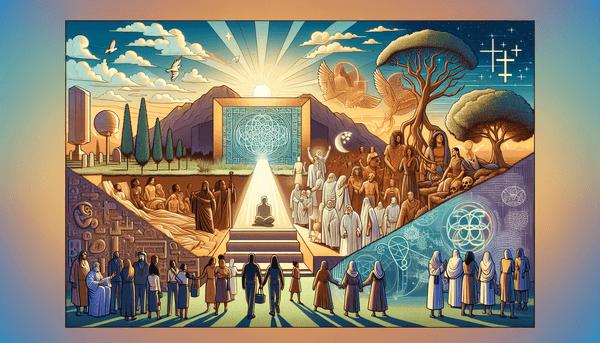Equality and Relationship Between Men and Women in the Bible
The biblical narrative begins with a profound declaration that both men and women are created in the image of God (Genesis 1:27). This foundational truth asserts the equal value and dignity of every person, affirming that in God's eyes, there is no distinction in worth between genders. Within the context of marriage, this equality takes on a relational dimension where women are encouraged to submit to their husbands as to the Lord, which is complemented by the call for husbands to love their wives sacrificially, as Christ loved the church (Ephesians 5:22-33). This dynamic reflects a relationship built not on hierarchy, but on mutual respect, love, and a shared submission to God's will. Additionally, the apostle Paul emphasizes the unity and equality of all believers in Christ, stating that there is neither male nor female in Jesus (Galatians 3:28), thereby elevating the status of women to one of full spiritual partnership with men.
Prophetic Insights into Resurrection from the Old Testament
The concept of resurrection is not exclusive to the New Testament but is also intricately woven into the fabric of Old Testament prophecy. Passages such as Isaia 26:19 and Daniel 12:2 speak of a time when the dead will rise, some to everlasting life and others to shame and everlasting contempt. These prophetic insights provide a glimmer of hope that transcends the mortal experience and point towards a divine promise of restoration. The fulfillment of these prophecies is seen in the resurrection of Jesus Christ, which stands as the cornerstone of Christian faith, affirming that those who are in Christ will also partake in this resurrection to eternal life (1 Corinthians 15:20-22). The promise of resurrection is not merely a future event but a present reality that inspires believers to live with purpose and hope, knowing that their faith is anchored in the victory over death that Christ has secured.
The Nature of Faith According to Hebrews
In the book of Hebrews, faith is described as the substance of things hoped for, the evidence of things not seen (Hebrews 11:1). This definition encapsulates the essence of faith as a firm confidence in God's promises and an assurance in the unseen realities of the spiritual realm. The eleventh chapter of Hebrews provides a litany of individuals who exemplified this faith, serving as enduring examples for believers. Faith is not passive; it demands an active response to God's word, a trust that is demonstrated through obedience even when the outcome is not visible (2 Corinthians 5:7). The call to live by faith challenges believers to exhibit a steadfastness that perseveres through trials, and to embody the conviction of their beliefs in their daily lives. To further explore this conviction, consider the insights and reflections on navigating the spiritual journey from biblical teachings, thereby proving the genuineness of their faith (James 2:17-18).
The Symbolism of the Tree of Life in Genesis
The Tree of Life, as introduced in the Garden of Eden, is a powerful symbol of God's life-giving presence and provision (Genesis 2:9). It represents not only the sustenance necessary for physical survival but also the promise of eternal life, which was initially within reach for Adam and Eve. However, after the fall, access to this tree was restricted, signifying the profound consequences of sin (Genesis 3:22-24). In Christian theology, the Tree of Life finds its ultimate fulfillment in Jesus Christ, the one who offers eternal life to all who believe. The Book of Revelation renews the hope of believers, portraying the Tree of Life in the New Jerusalem, whose leaves are for the healing of the nations (Revelation 22:2), symbolizing the restorative power of God's future kingdom.
The Criteria of Faithfulness in the Christian Life
Being faithful is a hallmark of the Christian life, encompassing steadfastness, loyalty, and obedience to God's word. It is through faithfulness that believers demonstrate their unwavering commitment to God's commandments and their consistent devotion to His teachings. This faithfulness is evidenced in the way they navigate life's trials, maintain their spiritual disciplines, and align their actions with divine principles. The Bible speaks of faithfulness as a fruit of the Spirit (Galatians 5:22-23), indicating that it is a virtue cultivated by the indwelling presence of the Holy Spirit. Faithfulness, therefore, is not merely a human endeavor but a divine work within the believer, enabling them to remain true to God's word and to reflect His character in their lives.
Conclusion
The biblical themes of equality, resurrection, faith, and symbolism offer invaluable insights that inform and enrich our spiritual journey. As we reflect on these principles, we can find guidance for our relationships, hope in the promise of resurrection, a deeper understanding of faith, and the comfort of God's enduring symbols like the Tree of Life. These themes are not isolated strands but are interwoven in the grand narrative of Scripture, revealing the heart of God and His purposes for humanity. An exploration into the 'Son of David', the scribes and Pharisees, and the message of Matthew 15 further illustrates these profound truths. May our exploration of these truths inspire us to live with greater conviction and to embody the love and grace that are at the core of the Christian faith.
FAQ
Q: Are women and men equal in the Bible?
A: Yes, the Bible affirms the equality of men and women, stating that both were created in the image of God (Genesis 1:27), and in Christ, there is no distinction between male and female (Galatians 3:28).
Q: Should women submit to men according to the Bible?
A: The Bible teaches that within the context of marriage, women are to submit to their husbands as to the Lord, but this is balanced by the command for husbands to love their wives as Christ loved the church (Ephesians 5:22-33), indicating a relationship of mutual respect and love.
Q: What are the Old Testament prophecies related to resurrection?
A: The Old Testament contains prophecies that speak of a future resurrection, such as in Isaiah 26:19 and Daniel 12:2, which is a promise of eternal life and vindication for the faithful.
Q: How is faith described in the book of Hebrews?
A: Faith is described in Hebrews as the substance of things hoped for and the evidence of things not seen (Hebrews 11:1), emphasizing a confident belief in God's promises and unseen realities.






